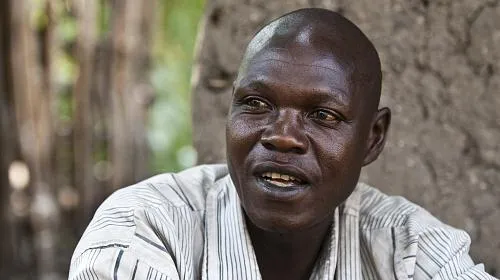At summit co-hosted by Angelina Jolie, CARE sounds call to engage men and boys in finding solutions, hosts panel with U.S. Ambassador at Large for Women’s Issues Catherine Russell
ATLANTA — CARE, one of the world’s leading humanitarian organizations, will join next week’s Global Summit to End Sexual Violence in Conflict, a first-of-its-kind attempt to rid the world of the scourge of warzone rape.
The summit, co-chaired by Special Envoy for the UN High Commissioner for Refugees Angelina Jolie and British Foreign Secretary William Hague, aims to bring world leaders together to pledge their commitment to ending sexual violence in conflict. Held June 10-13 in London, it will be the largest-ever gathering on the subject.
CARE’s focus during the summit will be to examine the root causes of sexual violence. CARE will discuss its successful strategy of engaging men and boys, the primary perpetrators of rape in warzones, in prevention efforts.
CARE is hosting two panel discussions during the event. Catherine Russell, the U.S. Ambassador at Large for Women’s Issues, will participate in a session examining ways donors, governments and non-governmental organizations can engage men and boys in preventing sexual and gender-based violence. CARE experts will detail positive results from its “Be a Man” project in The Balkans.
A second panel entitled “When Soldiers Come Home,” will examine what happens when the trauma of war moves from the front line to the family as well as explore how to work with men and boys to combat the cycle of violence when war ends.
“We call on governments around the world to recognize that teaching boys to respect women, challenging and changing their attitudes, and overcoming everyday sexism can help prevent sexual violence, both in times of peace and during conflict,” said Helene Gayle, president and CEO of CARE. “Men and boys can be allies and champions for change, and together we can stop the cycle of violence from reaching the next generation.”
Globally, one in three women will be raped, beaten, coerced into sex or otherwise abused in her lifetime. The impact of this global epidemic is far reaching. According to the World Bank, gender-based violence accounts for as much death and ill-health in women aged 15-44 years as cancer does. It is a greater cause of ill-health than malaria and traffic accidents combined. CARE believes that this cycle of violent discrimination against girls and women can – and must – change.
CARE’s work in the Balkans, Uganda, Rwanda and Burundi has shown that working with men and boys really can break the cycle of violence. In parts of the Balkans, our work to teach boys and young men about respect, consent and non-violence in relationships has been scaled up by the government and is already on the school curriculum. In Pristina, Kosovo, 73% of young male adults now say it is wrong to use violence against an unfaithful partner, compared to 48% before.
About CARE:
Founded in 1945, CARE is a leading humanitarian organization fighting global poverty. CARE has more than six decades of experience helping people prepare for disasters, providing lifesaving assistance when a crisis hits, and helping communities recover after the emergency has passed. CARE places special focus on women and children, who are often disproportionately affected by disasters. To learn more, visit www.care.org.
Media Contacts:
For more information, or to arrange interviews with CARE experts, contact Nicole Harris, nharris@care.org, 404-735-0871.
Resources:
Read our full Summit policy position paper.
Read CARE’s report on its Young Men’s Initiative in the Balkans.
For almost 20 years, CARE has addressed the underlying causes of gender-based violence and its effect on survivors in both conflict and stable development settings. A new report, Challenging Gender-based Violence Worldwide, analyses the impact of this work and how to build momentum based on extensive findings from our work in 58 countries to tackle violence against women.

